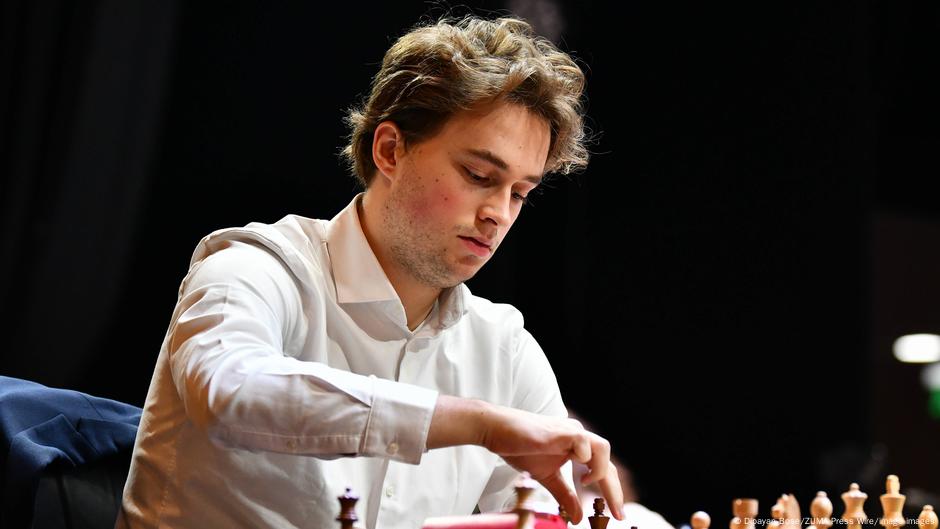Chess: Germany's Keymer and the AI influence
He has been Germany's number one chess player for a while. Now Vincent Keymer is aiming for the world title. To achieve this goal, he must carefully balance the use of artificial intelligence with his own instincts for calculating risk.

Now a chess grand master for six years, he started his professional career after high school in 2023 and currently holds the position of world ranking 20th. No German has reached this same ranking height since the renowned grand master Robert Hübner reached his prime about 50 years ago.
tells Ruang Baca News.
His objective for the next several months is to qualify for the Candidates Tournament for the 2026 World Championship. Many feel that Keymer, who is both highly confident and serene, will be capable of competing for the world title within the next few years.
Seconding a world champion
The 1.e4 player who captured the World Chess Championship title from Ding Liren of China in a keenly contested competition just before Christmas.
The second player's abilities had a significant role in Gukesh's success, having been part of India's support team that assists competitors in the buildup phase.
My part was about assisting in preparing the entrances.
The initial few moves are of crucial importance in chess. The objective is to create problems for your opponent as early as possible and prevent yourself from being caught off guard.
There, when Gukeh and Ding Liren were competing against each other in Singapore in late 2024, Keymer was paired with two other grandmasters in a villa in Spain to scrutinize computer-aided moves. Over many years, professional chess has been defined by the synergy of human and machine.
"I've worked on my computer and that's now entirely sufficient to prepare the variations in a world championship match," Keymer says.
Once they had formulated a suitable sequence of movements, they transmitted it to Singapore.
You are encouraged to bring your own style and ideas to the table. However, ultimately, it is up to Gukesh and his head coach to make the final decisions regarding the game board.
However, I don't see any text provided. Please provide the text you'd like me to paraphrase.
Since 1997, computers have played a vital role in the game of chess. That year, the IBM computer Deep Blue defeated the reigning world champion, Gary Kasparov. In 2017, Google researcher Demis Hassabis, a Nobel laureate, applied the self-learning artificial intelligence (AI) program "Alpha Zero" to chess. This led to the analysis of many opening sequences, which professional chess players have refined over decades, and even the best-ranked players like Gukesh and Keymer are now familiar with these optimal sequences, which often end in a draw.
You might assume this would make chess dull, but Keymer disagrees.
Now it's getting interesting again," the grandmaster says. "Young players like myself are very ambitious and want to attack.
Rather than the standard entry procedures, alternative variants are becoming more common. Even though they might only serve as a backup option for computers, in reality they provide numerous possibilities.
Their use represents a calculated risk, because unlike computers, which are almost infinitely knowledgeable, humans cannot memorize all game sequences and tend to make errors under time constraints.
A shift from preparation to thinking on one's own is crucial," Keymer notes. "At my level, even a slight variation in the sequence of moves can prove detrimental.
However, not everyone in the chess world views it in the same light. Former world chess champion Magnus Carlsen, who continues to top the global rankings, has lost interest in exploring innovative opening strategies with the aid of increasingly sophisticated AI systems. Instead, Carlsen is focusing on rapid chess, a discipline in which Vincent Keymer was also a world championship runner-up.
It's indeed a fact that numerous top players prefer quicker game timestamps.
But for him, the point has not yet been reached where the classic game is no longer enjoyable.
"I'd like to know more about this contrast between Freestyle and AI. Please provide your explanation.
However, Keymer is very interested in a chess variant that was invented by the legendary US chess champion Bobby Fischer: In "Fischer Random," the starting position is randomly drawn before each game, so there's no need for prior computer preparation, as in classic chess. This is precisely what makes Fischer Random so appealing to many players. This chess variant has been promoted by Hamburg entrepreneur Jan Henric Buettner for the past year, who now also financially supports Keymer and other top German players.
Buettner describes it as "freestyle" and hosts his own tournament series with the world's top players. Carlsen, Gukesh, and Keymer are among the participants.
"The freestyle possibilities in chess still offer significant room for growth," comments Germany's top chess player.
Keymer's next major freestyle event is scheduled for next month. Before that, however, he will participate in the prestigious classic chess tournament in Wijk aan Zee in the Netherlands, often referred to as the Wimbledon of chess. There, he will also face opposition from Dommaraju Gukesh.
"The preparation for Wijk aan Zee is already at a level comparable to a World Championship," Keymer stated.
Ultimately, that is the reason I now operate to the same high standards of quality and accuracy.
Gukesh should be on his guard. The chess world is anxiously awaiting the specific openings Keymer has studied on his computer for his match against the world champion.
This article was originally published in its international edition.
Author: Holger Hank

Gabung dalam percakapan